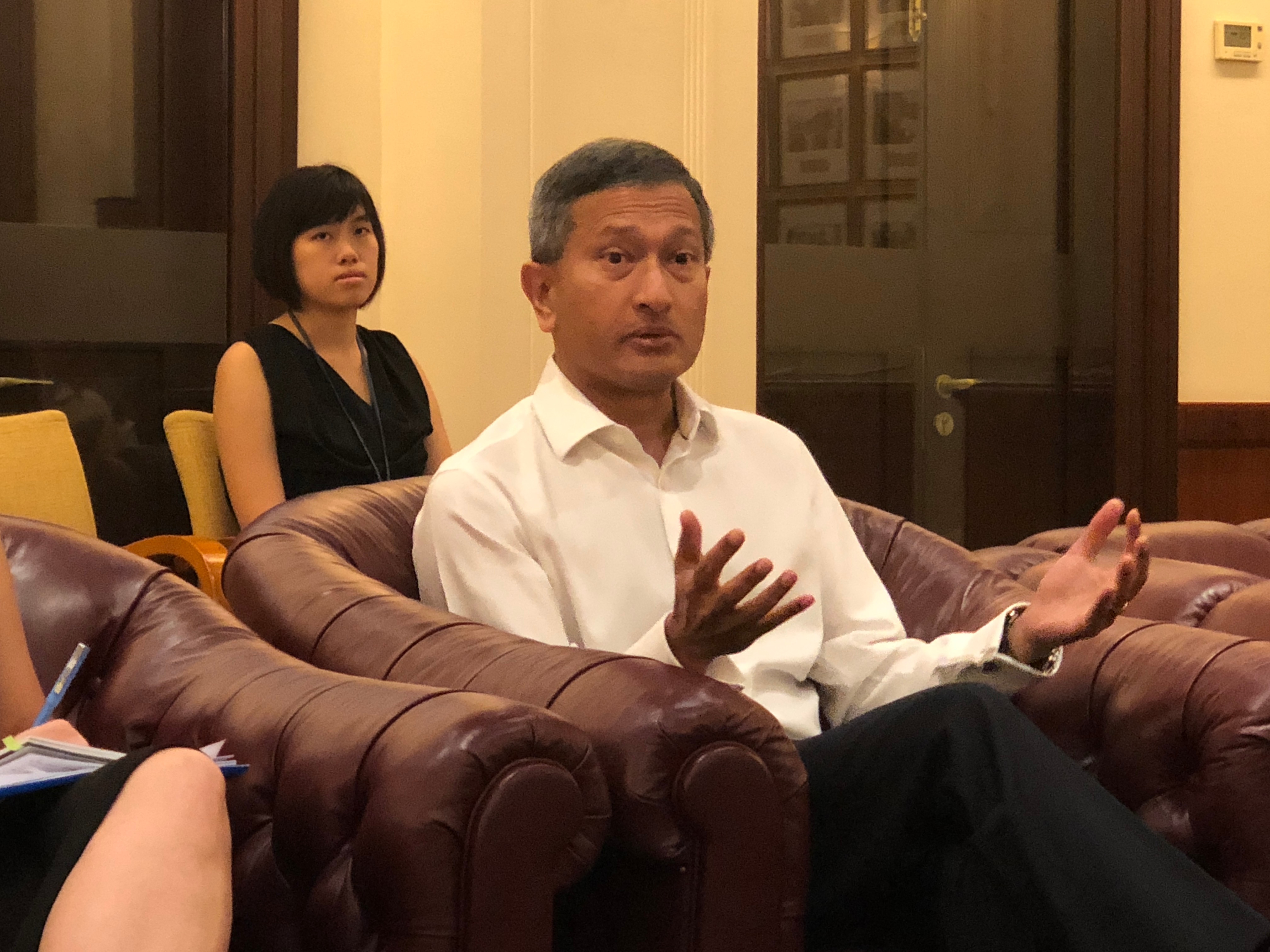Singapore asserts rule of law to calm South China Sea tensions | ABS-CBN
ADVERTISEMENT

Welcome, Kapamilya! We use cookies to improve your browsing experience. Continuing to use this site means you agree to our use of cookies. Tell me more!
Singapore asserts rule of law to calm South China Sea tensions
Singapore asserts rule of law to calm South China Sea tensions
Tarra Quismundo,
ABS-CBN News
Published Aug 07, 2018 02:26 PM PHT
SINGAPORE - Singapore's top diplomat on Monday reiterated the need to resolve disputes in the South China Sea peacefully based on the rule of law, saying even parties without claims to the waters are affected when tensions escalate.
SINGAPORE - Singapore's top diplomat on Monday reiterated the need to resolve disputes in the South China Sea peacefully based on the rule of law, saying even parties without claims to the waters are affected when tensions escalate.
"We are not a claimant, fortunately we are not a party to that dispute. But even non-claimant states are dependent on peace and stability, freedom of navigation and overflight in the South China Sea," Singapore Foreign Minister Vivian Balakrishnan told reporters here.
"We are not a claimant, fortunately we are not a party to that dispute. But even non-claimant states are dependent on peace and stability, freedom of navigation and overflight in the South China Sea," Singapore Foreign Minister Vivian Balakrishnan told reporters here.
Balakrishnan was asked about Singapore’s approach to handling the dispute as host of Association of Southeast Asian Nation meetings this year.
Balakrishnan was asked about Singapore’s approach to handling the dispute as host of Association of Southeast Asian Nation meetings this year.
Singapore believes in respecting international law, "and that countries do not use force or even resort to threat and use of force in order to resolve disputes," he said.
Singapore believes in respecting international law, "and that countries do not use force or even resort to threat and use of force in order to resolve disputes," he said.
ADVERTISEMENT
Balakrishnan cited how tension in the waters, a vital shipping lane through which $5 trillion in ship-borne trade passes every year, could ramp up costs for parties without any claims.
Balakrishnan cited how tension in the waters, a vital shipping lane through which $5 trillion in ship-borne trade passes every year, could ramp up costs for parties without any claims.
"Even if you don’t have a conflict, even if there’s no conflict but there is increased tensions, immediately your shipping costs, insurance premiums will go up, it has a very real economic impact on us, on everyone," he said.
"Even if you don’t have a conflict, even if there’s no conflict but there is increased tensions, immediately your shipping costs, insurance premiums will go up, it has a very real economic impact on us, on everyone," he said.
"Even if there’s no bullets fired, tensions alone has a real price to pay. That’s the first consideration, peace and stability, so that you don’t mess up trade and mess up our economy," he said
"Even if there’s no bullets fired, tensions alone has a real price to pay. That’s the first consideration, peace and stability, so that you don’t mess up trade and mess up our economy," he said
ASEAN meetings, where dialogue partners from outside the region also participate, have served as a platform for discussions on the sea dispute, particularly with a Code of Conduct in the works with China.
ASEAN meetings, where dialogue partners from outside the region also participate, have served as a platform for discussions on the sea dispute, particularly with a Code of Conduct in the works with China.
Chinese claims to nearly all of the resource-rich waters compete with 5 other parties, including ASEAN members the Philippines, Vietnam, Brunei and Malaysia.
Chinese claims to nearly all of the resource-rich waters compete with 5 other parties, including ASEAN members the Philippines, Vietnam, Brunei and Malaysia.
ADVERTISEMENT
During the Philippines’ hosting last year, ASEAN and China agreed to begin negotiations on a sea code while the question of sovereignty remains unresolved.
During the Philippines’ hosting last year, ASEAN and China agreed to begin negotiations on a sea code while the question of sovereignty remains unresolved.
At a foreign ministers’ meeting here last week, ASEAN and China agreed to negotiate the Code of Conduct based on a single text, the Straits Times reported.
At a foreign ministers’ meeting here last week, ASEAN and China agreed to negotiate the Code of Conduct based on a single text, the Straits Times reported.
"We talked about ASEAN unity and centrality… We still think ASEAN should remain united when we negotiate the COC," Balakrishnan said at Monday’s briefing.
"We talked about ASEAN unity and centrality… We still think ASEAN should remain united when we negotiate the COC," Balakrishnan said at Monday’s briefing.
"When sovereignty is concerned, you can argue for many many lifetimes. Don’t expect quick solutions but I believe it is possible to lower tension even though the underlying disputed is not fully settled," he said.
"When sovereignty is concerned, you can argue for many many lifetimes. Don’t expect quick solutions but I believe it is possible to lower tension even though the underlying disputed is not fully settled," he said.
ADVERTISEMENT
ADVERTISEMENT




